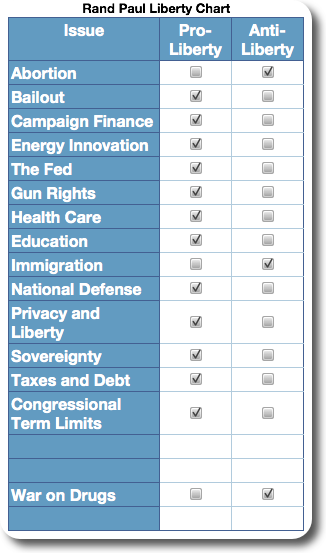The Rand Paul Review
Friday 14 May 2010 - Filed under Government + Kentucky + Rand Paul
 Being a Kentuckian with an interest in liberty, I find myself in the envious position of perhaps having a senatorial candidate in my state commonwealth who can legitimately be perceived as a guy who isn’t a political douchebag. Rand Paul (R-KY) has a strong pro-liberty pedigree in that his father, the venerable Ron Paul (R-TX), was the Libertarian Presidential candidate in 1988. His father has, more or less, libertarian views on most issues. But does Rand? A lot has been written about Rand Paul of late, and of his connections to his father’s political campaign in 2008, but none have been sufficiently illuminating as to whether, or how much, his political views differ from his father. Perhaps the best evidence that he is a pro-liberty candidate is that the GOP establishment seems threatened by him. They see him as an outsider. Someone who will not allow the status quo of the Big Government Republitard establishment to remain unmolested and intact. For a Team Red candidate who is actually pro-freedom, as opposed to subscribing to the Conservatard definition of pro-freedom, the best thing Dick Cheney can say about you is “I know a real conservative when I see one”, and that Paul is not it. In our current political climate where Tea Partiers oppose even their own traditional political establishment on issues of the exponential growth of government, being distanced from the GOP political establishment is turning out to be a good thing. One thing is for sure, however. Though Paul may oftentimes lean Libertarian on many issues, particularly fiscal issues, Paul is not a Libertarian.
Being a Kentuckian with an interest in liberty, I find myself in the envious position of perhaps having a senatorial candidate in my state commonwealth who can legitimately be perceived as a guy who isn’t a political douchebag. Rand Paul (R-KY) has a strong pro-liberty pedigree in that his father, the venerable Ron Paul (R-TX), was the Libertarian Presidential candidate in 1988. His father has, more or less, libertarian views on most issues. But does Rand? A lot has been written about Rand Paul of late, and of his connections to his father’s political campaign in 2008, but none have been sufficiently illuminating as to whether, or how much, his political views differ from his father. Perhaps the best evidence that he is a pro-liberty candidate is that the GOP establishment seems threatened by him. They see him as an outsider. Someone who will not allow the status quo of the Big Government Republitard establishment to remain unmolested and intact. For a Team Red candidate who is actually pro-freedom, as opposed to subscribing to the Conservatard definition of pro-freedom, the best thing Dick Cheney can say about you is “I know a real conservative when I see one”, and that Paul is not it. In our current political climate where Tea Partiers oppose even their own traditional political establishment on issues of the exponential growth of government, being distanced from the GOP political establishment is turning out to be a good thing. One thing is for sure, however. Though Paul may oftentimes lean Libertarian on many issues, particularly fiscal issues, Paul is not a Libertarian.
While being questioned for a Time Magazine article, Paul states, “They thought all along that they could call me a libertarian and hang that label around my neck like an albatross, but I’m not a libertarian.” In an interview with the New York Times, when asked if he was a libertarian like his father, Paul replies, “I call myself a constitutional conservative.” Hardly an endorsement for freedom if the idea of “conservative” swings at all towards social conservatism, that fucktarded condition in which conservatards feel they have the moral authority to tell others how they may or may not live their lives.
He’s also a bit inconsistent when arguing particular points on his website, and has already flopped on a couple of issues, which is a bit puzzling and concerning. While addressing political speech, he shows deference to both paid and personal speech, yet shows them both as being treated as inferior to one another. In effect, in his estimation personal speech is both treated better and worse than paid political speech by the political classes. In his section on Campaign Finance Reform, Paul writes,
This dangerous piece of legislation is a blatant violation of the First Amendment. My anti-tax group is prohibited from purchasing ads criticizing a congressman within 60 days of an election. McCain-Feingold and the courts believe that paid speech by private citizens is somehow different from speech by the mainstream media. They refuse to acknowledge that a newspaper editorial is also paid speech, in that it costs money to produce and even has an equivalent price if a political party wants to buy the column inches. Yet the law treats the individual’s speech as somehow less worthy of protection. (Emphasis mine)
But on his Guns and Politicians page he writes,
How many supposedly pro-Gun politicians supported the McCain-Feingold Act, which makes it illegal for gun rights groups to buy advertising criticizing a federal legislator for voting for gun control? Apparently, these fair-weather friends don’t believe the 1st amendment applies to paid political speech. (Emphasis mine)
It doesn’t take much brain capital to understand that either paid speech is less important than personal speech, or that it isn’t. Paul seems to zealously take both positions in an effort to assert his political viewpoint that both forms of speech are equally important. It certainly isn’t the end of the world, but consistency never hurt freedom either.
He’s also flipped on abortion as well, originally holding to the idea that it should be a decision made by states rather than the federal government (a popular starting point for Paul, but ultimately still anti-freedom in terms of abortion), but once he was charged with being “too flimsy” on abortion by some of the many smear tactic ads and websites set up by the GOP establishment and those who support it, he took a more hardened stance against abortion, asserting that it is an issue which should be decided on the federal level, and, as I’ll write about more in depth when I specifically address his views of abortion, that he’ll actively do whatever he can to push the anti-abortion agenda in Washington by supporting an anti-abortion amendment to the constitution. Again, consistency is the only way to attain liberty, and he hasn’t shown it when it comes to abortion.
Below is a tabulation of many of the viewpoints he expresses on his website as the official stance in his political platform. I have made my own determinations from a practical libertarian point of view1 as to whether those viewpoints represent an ideology which is in furtherance of, or opposed to, Liberty. In the coming weeks, I’ll analyze some of his less clear positions to explain why I find he’s good for liberty or not on a particular issue.
You’ll notice that the “War on Drugs” category is separate from the other issues listed and there is a sepcific reason for that. He has not publicly expressed a clear cut position on the War on Drugs, or how the federal government is going about it. I have found, in my research, only 2 instances in which he has addressed the War on Drugs, and they conflict (not a good sign), but have come to the conclusion of “Anti-Liberty” based on the idea that neither of the 2 positions he has publicly espoused falls in line with a Libertarian point of view. I will definitely be addressing his 2 statements in detail and will show why neither of them are consistent with freedom.
_________________
1. I come from a practical libertarian background as opposed to a strictly philosophical libertarian point of vew. I believe in NOT allowing the perfect to get in the way of the good, even if it sometimes conflicts with pure libertarian doctrine. I’m of the firm belief that philosophy NEVER works out in reality the way it appears in books and slogans, and that philosphies are a good place to start, but that human reality must come in to play at some point.
2010-05-14 » madlibertarianguy
